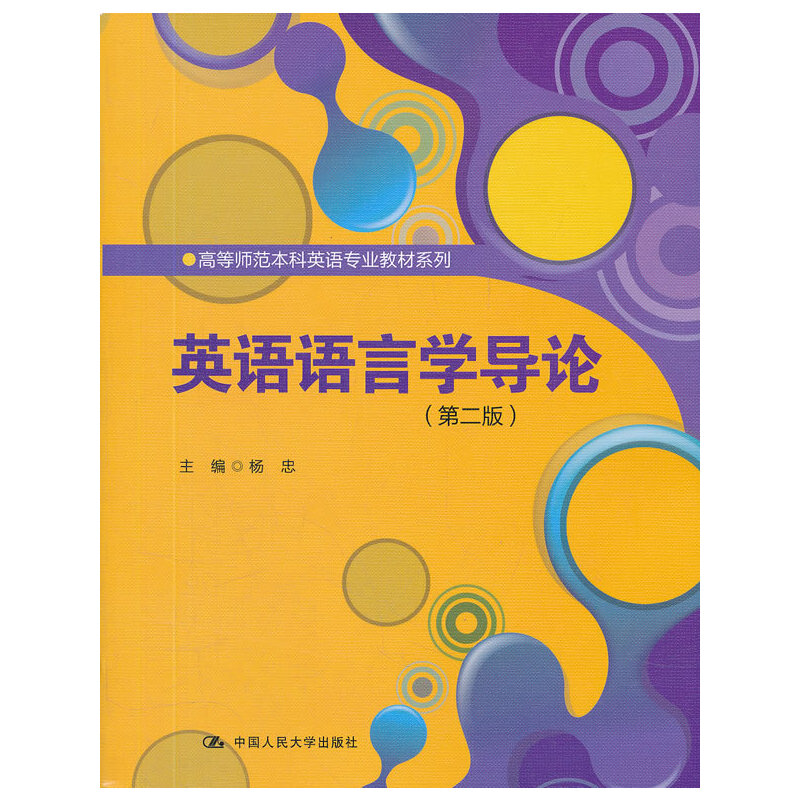英语语言学导论(第二版) / 高等师范本科英语专业教材系列
定价:¥29.80
作者: 杨忠
出版时间:2012-02
出版社:中国人民大学出版社
- 中国人民大学出版社
- 9787300147161
- 1-6
- 258948
- 2012-02
- 338
- 248
- H31
内容简介
《英语语言学导论(第2版)》是面向高等学校英语专业学生的教材,旨在帮助学生掌握现代语言学的基本概念、基本理论、基本方法,引发学生对语言本质、语言学习过程、跨文化交际、语言教学原理的深入思考,培养学生初步的语言研究能力。
目录
Chapter 1 Language and Linguistics
1.1 The multifaceted nature of language
1.2 Features of language
1.3 Functions of language
1.4 Types of language
1.4.1 Natural languages and artificial languages
1.4.2 Genetic classification of languages
1.4.3 Typological classification of languages
1.5 The evolution of language
1.6 Linguistics: the scientific study of language
1.6.1 Linguistics as a science
1.6.2 Branches of linguistics
1.6.3 Schools of linguistics
1.6.4 Features of modern linguistics
Chapter 2 Phonetics: The Study of Speech Sounds
2.1 The study of speech sounds
2.2 The sound-producing mechanism
2.3 Phonetic transcription of speech sounds
2.3.1 Unit of representation
2.3.2 Phonetic symbols
2.4 Description of English consonants
2.5 Description of English vowels
2.6 Phonetic features and natural classes
Chapter 3 Phonology: The Study of Sound Systems and Patterns
3.1 The study of sound systems and patterns
3.2 Phonemes and allophones
3.3 Discovering phonemes
3.3.1 Contrastive distribution
3.3.2 Complimentary distribution
3.3.3 Free variation
3.3.4 The discovery procedure
3.4 Distinctive features and non-distinctive features
3.5 Phonological rules
3.6 Syllable structure
3.7 Sequence of phonemes
3.8 Suprasegmental features
3.8.1 Stress
3.8.2 Intonation
3.8.3 Tone
3.8.4 The functioning of stress and intonation in English
Chapter 4 Morphology: The Study of Word Structure
4.1 Word, lexeme and morphology
4.2 Morpheme: the minimal meaningful unit of language
4.3 Root, base and stem
4.4 Classification of morphemes
4.4.1 Free and bound morphemes
4.4.2 Inflectional and derivational morphemes
4.5 Formation of English words
4.5.1 Derivation
4.5.2 Compounding
4.5.3 Other types of English word formation
Chapter 5 Syntax: The Analysis of Sentence Structure
5.1 Grammaticality
5.2 Knowledge of sentence structure
5.3 Different approaches to syntax
5.4 Transformational-generative grammar
5.4.1 The goal of a TG grammar
5.4.2 Syntactic categories
5.4.3 Phrase structure rules
5.4.4 Tree diagrams
5.4.5 Recursion and the infinitude of language
5.4.6 Subcategorization of the lexicon
……
Chapter 6 Semantics: The Analysis of Meaning
Chapter 7 Pragmatics: The Analysis of Meaning in Context
Chapter 8 Text Analysis: Exploring Principles of Text
Construction
Chapter 9 Language and Society
Chapter 10 Language and Culture
Chapter 11 Second Language Acquisition
Chapter 12 Linguistics and Foreign Language Teaching
References
Key to Exercises
An English-Chinese Glossary
Appendix Ⅰ The Indo-European Language Family
Appendix Ⅱ Families/Groups of Languages
Appendix Ⅲ 语言学学习方法举要
1.1 The multifaceted nature of language
1.2 Features of language
1.3 Functions of language
1.4 Types of language
1.4.1 Natural languages and artificial languages
1.4.2 Genetic classification of languages
1.4.3 Typological classification of languages
1.5 The evolution of language
1.6 Linguistics: the scientific study of language
1.6.1 Linguistics as a science
1.6.2 Branches of linguistics
1.6.3 Schools of linguistics
1.6.4 Features of modern linguistics
Chapter 2 Phonetics: The Study of Speech Sounds
2.1 The study of speech sounds
2.2 The sound-producing mechanism
2.3 Phonetic transcription of speech sounds
2.3.1 Unit of representation
2.3.2 Phonetic symbols
2.4 Description of English consonants
2.5 Description of English vowels
2.6 Phonetic features and natural classes
Chapter 3 Phonology: The Study of Sound Systems and Patterns
3.1 The study of sound systems and patterns
3.2 Phonemes and allophones
3.3 Discovering phonemes
3.3.1 Contrastive distribution
3.3.2 Complimentary distribution
3.3.3 Free variation
3.3.4 The discovery procedure
3.4 Distinctive features and non-distinctive features
3.5 Phonological rules
3.6 Syllable structure
3.7 Sequence of phonemes
3.8 Suprasegmental features
3.8.1 Stress
3.8.2 Intonation
3.8.3 Tone
3.8.4 The functioning of stress and intonation in English
Chapter 4 Morphology: The Study of Word Structure
4.1 Word, lexeme and morphology
4.2 Morpheme: the minimal meaningful unit of language
4.3 Root, base and stem
4.4 Classification of morphemes
4.4.1 Free and bound morphemes
4.4.2 Inflectional and derivational morphemes
4.5 Formation of English words
4.5.1 Derivation
4.5.2 Compounding
4.5.3 Other types of English word formation
Chapter 5 Syntax: The Analysis of Sentence Structure
5.1 Grammaticality
5.2 Knowledge of sentence structure
5.3 Different approaches to syntax
5.4 Transformational-generative grammar
5.4.1 The goal of a TG grammar
5.4.2 Syntactic categories
5.4.3 Phrase structure rules
5.4.4 Tree diagrams
5.4.5 Recursion and the infinitude of language
5.4.6 Subcategorization of the lexicon
……
Chapter 6 Semantics: The Analysis of Meaning
Chapter 7 Pragmatics: The Analysis of Meaning in Context
Chapter 8 Text Analysis: Exploring Principles of Text
Construction
Chapter 9 Language and Society
Chapter 10 Language and Culture
Chapter 11 Second Language Acquisition
Chapter 12 Linguistics and Foreign Language Teaching
References
Key to Exercises
An English-Chinese Glossary
Appendix Ⅰ The Indo-European Language Family
Appendix Ⅱ Families/Groups of Languages
Appendix Ⅲ 语言学学习方法举要




